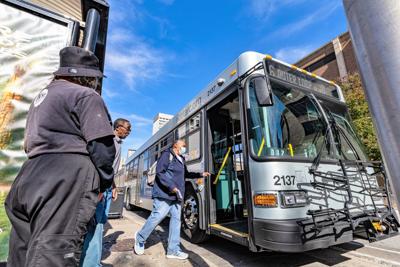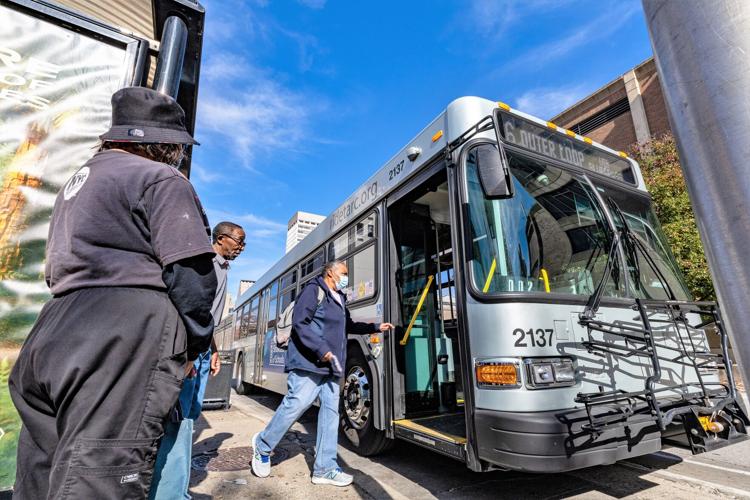LOUISVILLE, Ky. (WDRB) -- Admitting it's on shaky financial ground and warning of a "fiscal cliff" looming in the not-too-distant future, TARC has its sights set on an aggressive initiative to adapt its service to Louisville's changing landscape.
Ridership on TARC buses plummeted during the COVID-19 pandemic and has yet to fully rebound. The transit agency's revenues aren't keeping pace with costs — as one-time federal funds are running dry — and the transportation system is struggling to keep up with growth patterns in outlying areas.
Those major challenges face Louisville's only public transit provider as its leaders embark on a long-range plan meant to guide service well into the next decade. Approved by board members in January, the "TARC Tomorrow" initiative aims to expand service, develop a network of routes with less time between buses and launch an "on-demand" service that resembles ride-sharing.
It is "not intended to be a shelf-ready plan," the report says. "Instead, this is a plan prepared with a clear aim—to be advanced to implementation" and revised often and with new information.
In fact, before making major progress on any goals, planners acknowledge that TARC first must deal with short- and long-term funding issues — from the looming loss of federal coronavirus money to setting the stage for a likely ballot referendum seeking more of the dedicated tax revenue it relies on.
"We're very clear-headed about the challenges of resources and funding but we felt like it's better to just be more upfront — that we know we can do more, but it does take more revenue and more resources to do that," said Carrie Butler, TARC's executive director.
The long-range plan is blunt: "Financial constraints are perhaps the largest threat to the success of TARC Tomorrow." And it warns of a looming "fiscal cliff" as a result of a budget that leans on one-time coronavirus aid that now makes up 31% of the agency's operating budget.
As WDRB News reported last fall, TARC is weighing an increase in the occupational tax paid by workers in Jefferson County to help boost funding for the transit agency. Raising the current rate on paychecks that has been in place since 1974 — 0.2% — would ultimately need voters' approval.
Butler said the timeline for a possible referendum is "still to be determined."
"We don't know, because it is such a big decision," she said. "And it is a big community endeavor."
TARC Tomorrow sets a series of goals and objectives in areas that include passenger experience, service and expansion, innovation and financial sustainability.
In crafting the plan, transit officials sought input from a steering committee and an advisory committee of 15 organizations representing community organizations, employers and others.
The latter committee included the Southwest Dream Team, a nonprofit economic development group, whose co-founder and president Vince Jarboe said he wants to ensure that people in southwestern Jefferson County who use TARC can still afford it.
Jarboe said TARC leaders were upfront about the need for more revenue.
"They were really struggling with figuring out how to get the funding that they need without having to raise fares, because that's what we didn't want to see," he said.
The nonprofit Americana Community Center, which works with Louisville's immigrant and refugee populations in the Southside neighborhood, also served on the committee. A TARC survey found about 23% of all riders spoke a language other than English in 2016, the most recent year for which data was available.
Americana development coordinator Gianna Bennett said it's helpful that TARC now provides cards that can be filled out ahead of boarding to let people who face language barriers communicate with drivers.
Ideally, she said, TARC would have an "interpretation system" on its buses so that riders can "feel safer and more confident that they know where they're going, especially if they're first arriving in the U.S. and not familiar with the public transportation system we have in Louisville."
Among TARC Tomorrow's short-term goals are conducting a study to create a list of locations with repeated delays and actions to address them; updating the bus stop inventory and evaluating which stops should be upgraded; and testing an "all-door boarding" system on at least one route and finding a way to expand it.
Butler said a major focus of the plan includes emphasizing routes on corridors, such as Dixie Highway, Broadway and Preston Highway. Dixie Highway is where TARC started its first "bus rapid transit" route in 2020, aiming to run nine buses from the Gene Snyder Freeway to downtown every 15 minutes during weekdays.
Seeking a federal grant to add similar service on Broadway is a short-term goal of the new plan, which dovetails with a Metro government-led master plan for Broadway that includes a TARC-only bus lane, among other features.
TARC's plan also envisions "premium transit service" like bus rapid transit on the Preston Highway corridor by 2025.
There also is interest in more frequent buses on the Frankfort Avenue/Shelbyville Road corridor, according to the plan. Butler, however, said any action there would occur after the Broadway and Preston work.
TARC was experiencing waning ridership even before the COVID-19 pandemic, according to its figures, with a 20% decline from 2014-18. New data show ridership levels climbed in 2022 to their highest levels since 2019.
But those counts still likely reflect changes wrought by the pandemic. TARC Tomorrow provides a glimpse into how workplace and other disruptions have affected passenger counts.
It cites "early indications" that routes on main corridors maintained ridership levels better than routes to the central business district downtown.
Butler said those trends, along with growth patterns for jobs in areas like Bullitt County and southern Indiana, also will influence future decisions about service.
"We've had the traditional sort of downtown office buildings and people commuting in in the morning and evening rush hour," she said. "And that — as many people are well aware — that's not exactly how people work anymore or commute."
One way to address rapidly changing transportation needs is through a reservation-based service for passenger vehicles that resembles ride-sharing apps like Uber and Lyft. Butler said that service will be "brought forward sooner."
She stressed that TARC envisions a service involving several passengers, not just one person in a car with a driver.
"Getting more people in one vehicle going to one destination — that's the way to drive down our costs," she said.
Copyright 2023 WDRB Media. All Rights Reserved.














